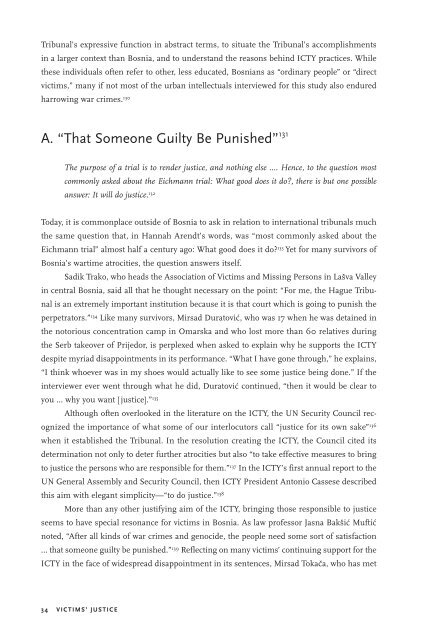That Someone Guilty Be Punished - International Center for ...
That Someone Guilty Be Punished - International Center for ...
That Someone Guilty Be Punished - International Center for ...
You also want an ePaper? Increase the reach of your titles
YUMPU automatically turns print PDFs into web optimized ePapers that Google loves.
Tribunal’s expressive function in abstract terms, to situate the Tribunal’s accomplishments<br />
in a larger context than Bosnia, and to understand the reasons behind ICTY practices. While<br />
these individuals often refer to other, less educated, Bosnians as “ordinary people” or “direct<br />
victims,” many if not most of the urban intellectuals interviewed <strong>for</strong> this study also endured<br />
harrowing war crimes. 130<br />
A. “<strong>That</strong> <strong>Someone</strong> <strong>Guilty</strong> <strong>Be</strong> <strong>Punished</strong>” 131<br />
The purpose of a trial is to render justice, and nothing else …. Hence, to the question most<br />
commonly asked about the Eichmann trial: What good does it do?, there is but one possible<br />
answer: It will do justice. 132<br />
Today, it is commonplace outside of Bosnia to ask in relation to international tribunals much<br />
the same question that, in Hannah Arendt’s words, was “most commonly asked about the<br />
Eichmann trial” almost half a century ago: What good does it do? 133 Yet <strong>for</strong> many survivors of<br />
Bosnia’s wartime atrocities, the question answers itself.<br />
Sadik Trako, who heads the Association of Victims and Missing Persons in Lašva Valley<br />
in central Bosnia, said all that he thought necessary on the point: “For me, the Hague Tribunal<br />
is an extremely important institution because it is that court which is going to punish the<br />
perpetrators.” 134 Like many survivors, Mirsad Duratović, who was 17 when he was detained in<br />
the notorious concentration camp in Omarska and who lost more than 60 relatives during<br />
the Serb takeover of Prijedor, is perplexed when asked to explain why he supports the ICTY<br />
despite myriad disappointments in its per<strong>for</strong>mance. “What I have gone through,” he explains,<br />
“I think whoever was in my shoes would actually like to see some justice being done.” If the<br />
interviewer ever went through what he did, Duratović continued, “then it would be clear to<br />
you … why you want [justice].” 135<br />
Although often overlooked in the literature on the ICTY, the UN Security Council recognized<br />
the importance of what some of our interlocutors call “justice <strong>for</strong> its own sake” 136<br />
when it established the Tribunal. In the resolution creating the ICTY, the Council cited its<br />
determination not only to deter further atrocities but also “to take effective measures to bring<br />
to justice the persons who are responsible <strong>for</strong> them.” 137 In the ICTY’s first annual report to the<br />
UN General Assembly and Security Council, then ICTY President Antonio Cassese described<br />
this aim with elegant simplicity—“to do justice.” 138<br />
More than any other justifying aim of the ICTY, bringing those responsible to justice<br />
seems to have special resonance <strong>for</strong> victims in Bosnia. As law professor Jasna Bakšić Muftić<br />
noted, “After all kinds of war crimes and genocide, the people need some sort of satisfaction<br />
… that someone guilty be punished.” 139 Reflecting on many victims’ continuing support <strong>for</strong> the<br />
ICTY in the face of widespread disappointment in its sentences, Mirsad Tokača, who has met<br />
34 VICTIMS’ JUSTICE

















